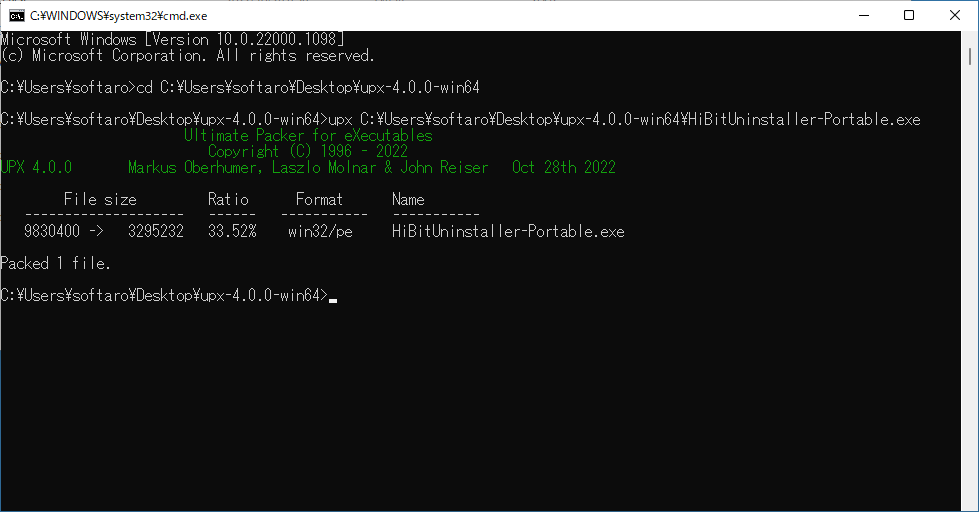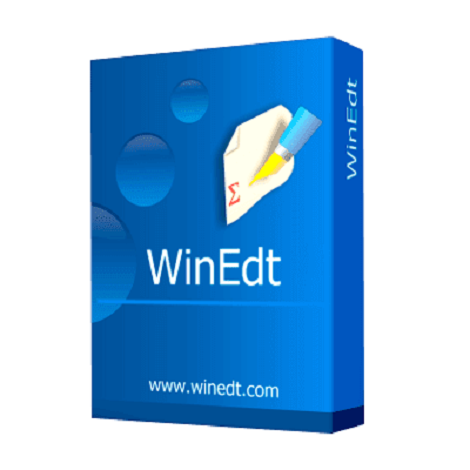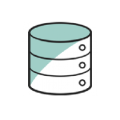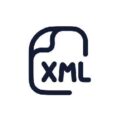Download UPX 4 full version program free setup for Windows. UPX is a lightweight compression utility that you can use to pack several executable formats, including applications, DLLs, DOS programs and Linux executables.
UPX Overview
UPX, which stands for the “Ultimate Packer for eXecutables,” is a widely-used open-source executable file compressor. It serves as a powerful tool for reducing the size of executable files while retaining their functionality. UPX is commonly employed to make software distribution more efficient by significantly decreasing the file size of applications without compromising their performance or features. One of UPX’s key features is its ability to compress executables from various programming languages and platforms. It works with executables produced by compilers such as C, C++, Delphi, and more, making it a versatile solution for developers working with different programming environments. This universality ensures that applications from different sources can benefit from the size reduction provided by UPX. UPX operates through a process known as executable file packing or compression. It analyzes the executable’s internal structure and employs advanced compression algorithms to remove redundant data and optimize the way the executable is stored. The result is a smaller file size that occupies less disk space and can be downloaded or distributed more quickly, which is particularly advantageous for software delivery over the internet. You may also like Hex-Rays IDA Pro 7 Free Download

Despite its impressive compression capabilities, UPX is designed to maintain the integrity of the original executable. It accomplishes this by decompressing the executable at runtime when it’s executed. This means that the end-user experiences no degradation in performance or functionality, as the executable is restored to its original state before being run. UPX is highly configurable, allowing developers to adjust compression levels and other settings according to their preferences and requirements. This flexibility ensures that developers can strike a balance between file size reduction and the potential impact on runtime performance. While UPX is primarily used to compress executables, it can also be used to compress other types of files, such as DLLs (Dynamic Link Libraries) and shared libraries, which can contribute to overall application size reduction.
In conclusion, UPX is a valuable tool in the software development ecosystem, offering an efficient way to reduce the file size of executables and other types of files without sacrificing performance. Its open-source nature, compatibility with multiple programming languages, and customizable compression options make it an essential utility for developers looking to optimize software distribution and improve user experience.
Features
- Cross-Platform Compatibility: UPX can compress executables on various platforms, including Windows, Linux, macOS, and more.
- Open-Source: UPX is open-source software, making its source code accessible for review and customization.
- Multiple Compression Algorithms: UPX offers a range of compression algorithms that users can choose from based on their needs.
- Executable Compression: UPX can compress executable files written in various programming languages, including C, C++, Delphi, and more.
- Dynamic Link Libraries (DLLs) Support: In addition to executables, UPX can compress DLLs and shared libraries to save space.
- Size Reduction: UPX significantly reduces the size of executable files, making software distribution more efficient.
- Lossless Compression: UPX achieves compression without loss of functionality or performance, as it decompresses the executable at runtime.
- Executable Integrity: UPX ensures that the decompressed executable matches the original, preserving functionality.
- Customizable Compression Levels: Users can adjust compression levels to balance file size reduction with runtime performance.
- Compression Ratio Analysis: UPX provides information about the achieved compression ratio, aiding in optimizing compression settings.
- Command-Line Interface: UPX can be used from the command line, allowing for automated compression processes.
- Graphical User Interface (GUI): GUI tools provide a user-friendly way to interact with UPX without using the command line.
- Decompression at Runtime: UPX decompresses the executable in memory at runtime, minimizing the impact on performance.
- File Format Support: UPX supports a wide range of executable file formats, ensuring compatibility with various compilers.
- Multiple Operating System Support: UPX can be used on different operating systems, making it a versatile choice for developers.
- Version Information Preservation: UPX retains version information and other attributes of the original executable.
- Resource Compression: UPX can compress resources embedded within executables, further reducing file size.
- Resource Integrity: Resources are decompressed and used seamlessly during runtime.
- Segmentation: UPX employs segmentation to compress sections of an executable, optimizing compression efficiency.
- Cryptographic Support: UPX can utilize various cryptographic methods for added security during compression.
- Plugin Architecture: UPX supports plugins that extend its capabilities or introduce additional compression algorithms.
- Multi-Threading Support: UPX can take advantage of multi-threading on systems with multiple processors or cores.
- Debug Information Handling: UPX can handle debug information in executables, retaining the ability to debug post-decompression.
- Executable Header Compression: UPX compresses executable headers to contribute to overall file size reduction.
- Relocation Table Handling: UPX preserves relocation information necessary for proper runtime execution.
- Automatic Unpacking: Some versions of UPX can automatically unpack UPX-compressed executables, if desired.
- LZMA Compression: UPX supports the LZMA compression algorithm for high compression ratios.
- Highly Configurable: UPX offers a wide range of configuration options to tailor compression to specific needs.
- Command-Line Batch Processing: UPX can be used in batch processing scripts for compressing multiple files simultaneously.
- File Timestamp Preservation: UPX retains original file timestamps post-decompression.
- Checksum Support: UPX supports checksumming to ensure integrity after decompression.
- Portable Executable (PE) Format Support: UPX works with the PE format commonly used in Windows executables.
- Compression Benchmarking: UPX provides tools for benchmarking compression efficiency against different algorithms.
- Free Software: UPX is distributed under the GNU General Public License, making it free to use and share.
- Manual Decompression: UPX can be manually unpacked if automatic decompression is not desirable.
- Online Documentation: UPX offers comprehensive online documentation to assist users with its features.
- Community Support: Users can engage with the UPX community for assistance, discussions, and sharing tips.
- Regular Updates: UPX is actively maintained and updated to keep up with evolving technology.
- Optimized for Size: UPX focuses on minimizing the size of executables, beneficial for software distribution and storage.
- Wide User Base: UPX is widely adopted by developers and organizations globally for executable compression needs.
Technical Details
- Software Name: UPX for Windows
- Software File Name: UPX-4.2.3.rar
- Software Version: 4.2.3
- File Size: 1.15 MB
- Developers: github
- File Password: 123
- Language: Multilingual
- Working Mode: Offline (You donÆt need an internet connection to use it after installing)
System Requirements
- Operating System: Win 7, 8, 10, 11
- Free Hard Disk Space:
- Installed Memory: 1 GB
- Processor: Intel Dual Core processor or later
- Minimum Screen Resolution: 800 x 600
What is the latest version of UPX?
The developers consistently update the project. You can view the most recent software update on their official website.
Is it worth it to install and use Software UPX?
Whether an app is worth using or not depends on several factors, such as its functionality, features, ease of use, reliability, and value for money.
To determine if an app is worth using, you should consider the following:
- Functionality and features: Does the app provide the features and functionality you need? Does it offer any additional features that you would find useful?
- Ease of use: Is the app user-friendly and easy to navigate? Can you easily find the features you need without getting lost in the interface?
- Reliability and performance: Does the app work reliably and consistently? Does it crash or freeze frequently? Does it run smoothly and efficiently?
- Reviews and ratings: Check out reviews and ratings from other users to see what their experiences have been like with the app.
Based on these factors, you can decide if an app is worth using or not. If the app meets your needs, is user-friendly, works reliably, and offers good value for money and time, then it may be worth using.
Is UPX Safe?
UPX is widely used on Windows operating systems. In terms of safety, it is generally considered to be a safe and reliable software program. However, it’s important to download it from a reputable source, such as the official website or a trusted download site, to ensure that you are getting a genuine version of the software. There have been instances where attackers have used fake or modified versions of software to distribute malware, so it’s essential to be vigilant and cautious when downloading and installing the software. Overall, this software can be considered a safe and useful tool as long as it is used responsibly and obtained from a reputable source.
How to install software from the WinRAR file?
To install an application that is in a WinRAR archive, follow these steps:
- Extract the contents of the WinRAR archive to a folder on your computer. To do this, right-click on the archive and select ”Extract Here” or ”Extract to [folder name]”.”
- Once the contents have been extracted, navigate to the folder where the files were extracted.
- Look for an executable file with a .exeextension. This file is typically the installer for the application.
- Double-click on the executable file to start the installation process. Follow the prompts to complete the installation.
- After the installation is complete, you can launch the application from the Start menu or by double-clicking on the desktop shortcut, if one was created during the installation.
If you encounter any issues during the installation process, such as missing files or compatibility issues, refer to the documentation or support resources for the application for assistance.
Can x86 run on x64?
Yes, x86 programs can run on an x64 system. Most modern x64 systems come with a feature called Windows-on-Windows 64-bit (WoW64), which allows 32-bit (x86) applications to run on 64-bit (x64) versions of Windows.
When you run an x86 program on an x64 system, WoW64 translates the program’s instructions into the appropriate format for the x64 system. This allows the x86 program to run without any issues on the x64 system.
However, it’s important to note that running x86 programs on an x64 system may not be as efficient as running native x64 programs. This is because WoW64 needs to do additional work to translate the program’s instructions, which can result in slower performance. Additionally, some x86 programs may not work properly on an x64 system due to compatibility issues.
What is the verdict?
This app is well-designed and easy to use, with a range of useful features. It performs well and is compatible with most devices. However, may be some room for improvement in terms of security and privacy. Overall, it’s a good choice for those looking for a reliable and functional app.
Download UPX 4 Latest Version Free
Click on the button given below to download UPX free setup. It is a complete offline setup for Windows and has excellent compatibility with x86 and x64 architectures.
File Password: 123






